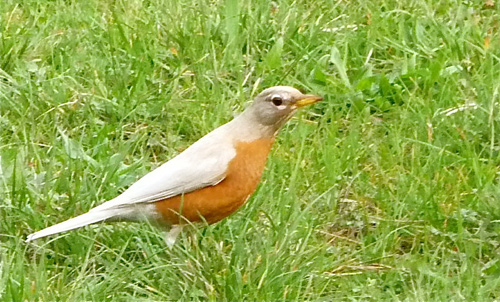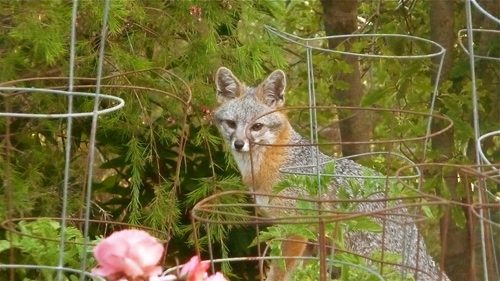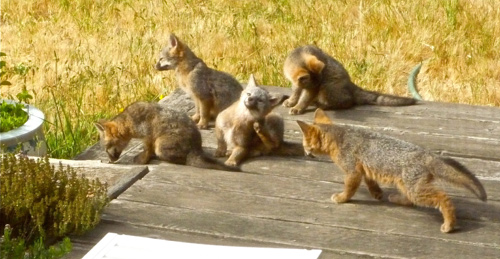Thu 31 Jul 2014
Sorry I’m late, but here are a bobcat, albino robin, and five fox kits to make up for it
Posted by DavidMitchell under West Marin nature, Wildlife
[4] Comments
Unfortunately, my posting is a bit late this week. Three afternoons visiting physicians, five and a half hours on Sunday in Kaiser Hospital’s Emergency Room, and an MRI scan on Monday put me behind in my schedule.
The medical consensus is that a couple of weeks ago I was hit with “temporal arteritis,” which is a big headache, believe me. Left untreated it can lead to blindness. Temporal arteritis amounts to inflammation of an artery that goes through the temples (hence the name “temporal”) and feeds blood to the eyes. The problem is common enough that rheumatologists have developed a standard treatment using the steroid Prednisone. The cause of temporal arteritis is unknown, but it mostly hits us older folks.
With me just out of sick bay, my neighbor Jay Haas has graciously stepped up to help with this week’s posting. Jay shot all the photos and tells much of the story.
Like Lynn and I, he and his wife Didi Thompson, get a fair amount of wildlife around their front door: bobcats, foxes, all manner of birds, and much more. In fact, we probably share many of the same animals.
The number of bobcats showing up around Point Reyes Station homes has increased in recent years. Some townspeople believe that the pastures of the Giacomini ranch had been the prime hunting grounds for a local bobcat population, but those cats were forced out when the Park Service bought the land and in 2007 flooded it.
A bobcat walking past Jay’s and Didi’s home. I suspect this is the same individual that for a few days roamed my fields next door.
White robin
The first robin of spring in the yard of Jay and Didi five years ago was an albino. “For some reason, albinism and partial albinism have been recorded in robins more than any other wild bird species,” this blog at the time quoted the the American Robin website as reporting.
One study found that 8.22 percent of all albino wild birds found in North America were robins. But only about one robin in 30,000 is an albino or partial albino. Most records of robins with albinism are only partial albinos, which of course live longer than total albinos.
As the American Robin explains, totally albino birds have no pigment in their irises and retinas to protect their eyes from sunlight, and many eventually go blind.
Providing a more-recent springtime show was a family of gray foxes that began appearing around the deck where Jay and his friends have been known to share a drink at the end of the day.
“The vixen and her kits, already fairly large, showed up one night under ‘The Gin Deck’ in late May 2012,” Jay wrote on Friday. “The kits would get fairly close to me on the deck,” he added, his toes bearing evidence of the fact.
Fox in the tomato bed.
“Mom would stand farther away and scowl at me.”
“The kits clearly had fleas, as they were scratching all the time.”
“One interesting observation was that when mom brought prey home, [such as] a bunny, the kits would fight over it. Then one would take it away and fight off its siblings, eating it all.
“After a few weeks, I had some friends visiting, and we were all out on the deck for quite some time. There goes the neighborhood. This was too much for mom; the next morning they were gone. Just as well; I was tired of cleaning up all the poop.”








Hope you are feeling better, Dave. Sounds like an uncomfortable ordeal. Thanks for posting your neighbor’s photos. The fox kits are too cute!! What a treat you all have getting such regular visitors.
I am so worried about you. I sure do hope the Prednisone works. These pictures are so cute. I did not know that foxes had litters. About the bobcats, it’s getting pretty scary around here. I know 4 people who have lost their cats lately, not counting The School Kitty. Everyone says it’s the Coyotes. I hope it’s not bobcats too, but I am sure it is. Terrible & sad to know your cat was eaten by a creature. Sad!
5/16/17 spotted first white robin in my 70yrs, Osceola Iowa took one photo.
how rare are they????
Here’s what Yahoo has to say about white robins: “The greatest numbers of albino birds reported have been the American Robin and the House Sparrow.” https://answers.yahoo.com/question/index?qid=20080322072848AAIjQOE